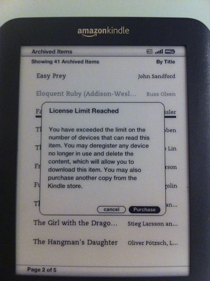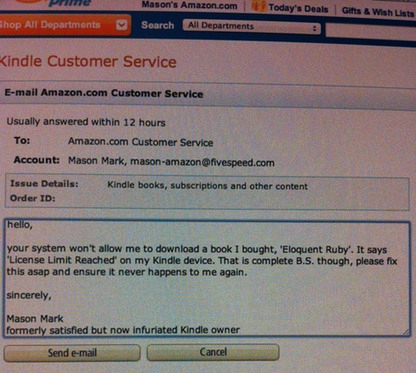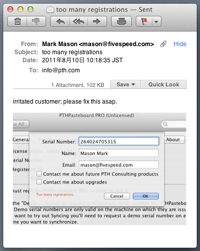DRM clusterfuck
 2011-08-10
2011-08-10An increasing percentage of the shit we buy today is encumbered by DRM. The acronym stands for 'digital rights management', but the 'digital restrictions management' moniker that freedom zealots came up with is probably more apt. That term never really caught on, though; most people don't have a real understanding of what DRM is, nor do they really give a fuck. And perhaps that's as it should be. Life is too short to waste much time on understanding bullshit, especially if you aren't going to use that understanding.
But one basic thing that people should understand is that virtually all DRM is broken. That is, if you buy a product restricted by DRM, at some point it will malfunction, and not only will you be prevented from doing all the things you aren't allowed to do, but you'll also be prevented from doing those things you are supposed to be able to do—-the things you paid to be able to do. This may happen through the incompetence or negligence of the party implementing the DRM. It may happen because they are sued, regulated, or go out of business. Or it may happen because they are just a bunch of fucking ass-clowns.
Today, for me, was a reminder of that--an infuriating exercise in DRM shit making my life just that little bit worse.
For all the happy things that have been born of humanity's digital two steps forward, DRM takes us the corresponding and inevitable one step back.Act I, in which our hero's kindle shits all over itself in a new way
I slept in late this morning. As a consequence, I was in a smidgen of a hurry, so I decided to take the subway to where I needed to be, instead of walking. Not wanting to be bored on the subway, I tried to download a book I had purchased (Russ Olsen's pretty great Eloquent Ruby[1]) onto my Kindle.

"License Limit Reached" the fucktarded little piece of cheap Chinese plastic told me. That was fucking bullshit, though. Not only did I not have this book installed on five devices simultaneously, I had never even installed it on that many devices total. Kindle was wrong.
I strongly suspect this malfunction was caused by the embarrassing and frankly disgusting bugs in Amazon's Kindle for Mac application, which I have previously detailed. It doesn't matter, though; whatever the underlying cause, Kindle's DRM had malfunctioned and there was fuck all that I could do about it, before dashing out of the house, other than send a terse and angry complaint to Amazon.

Act II, in which our hero is reminded that we've been using DRM for decades
Arriving at my destination, I resumed the task of setting up my recently-purchased MacBook Air. This work I have spread out over the past few days, installing little bits throughout the day as I work on other stuff on my main machine.
Because working on a computer that doesn't remember the last few hundred things you've copied/pasted is as batshit insane as using only your pinkie fingers to type on your keyboard, I always install a clipboard history application when setting up a Mac.
For this, I've been using PTHPasteboard Pro for years, and it has performed admirably. It's a very ugly little app whose inner beauty shines through when it is put to use. I have recommended this app because I use it every single day, and have always liked it.
Until today, when its shitty DRM system rudely told me to go fuck myself. "Too many registrations," it said in rude little red text. Too many for what, you fucking little piece of shit? Again, I had no recourse other than to send a terse and angry email.

And—boom!—just like that, PTHPasteboard went from a trusted piece of software that I install on every new Mac to one that I will probably never install or recommend again.
That isn't an overreaction. It is an appropriate reaction. Wasting my time is an offense that I should and do take seriously. Even though in this case it was only a few minutes--so what, fuck off. Plenty multi-clipboard utilities in the baller-user matrix.
This reminded me, though, that for all the bitching about DRM on songs and movies and books, we've suffered DRM on our commercial software since commercial software was invented.
Act III, in which a pioneer of broken DRM pushes the needle on the irritometer into the red, causing our hero to waste the remainder of his morning writing a cathartic rant to post to his blog
Grog want play music. Grog have new Mac. Grog new Mac not authorized. Grog try authorize. Grog get error message! Grog ANGRY!! GROG SMASH!!!!

The trouble with software is that no matter how much of an asshole it is, you can't bash its motherfucking head open with a huge rock, peel off the skull, and feast on its brains. That's just not possible, even though the more primitive parts of your own brain might seethe with bloodlust when confronted with the dialog above.
That's what happened when I tried to authorize my new laptop for iTunes content. It was only 11:00 a.m., and I'd already run up against three different DRM fuckups from three different companies.
Across its hundreds of millions of users, iTunes has probably cumulatively wasted a hundred man-years of human potential with DRM fuckery. iTunes is the archduke of DRM. With iTunes, Apple popularized comercial downloadable music, and with it, DRM.
Years ago, iTunes inflicted upon me what I hope was the most idiotic DRM-related experience I will ever have.
I was in Tokyo, hanging out with a beautiful young woman. She asked me about something she heard in a song, called Diggin' On You. I wasn't familiar with the song, it being some kind of crappy chick music, so I suggested we download it. This was before Japan had its own iTunes store, so she was also interested in this buying-music-online concept.
So I fired up iTunes. The laptop I was using was my work machine, so iTunes wasn't set up. I accepted the EULA (without reading of course), entered my username and password, did a quick search, found the song, entered my credit card number, and bought it.
Cellular data wasn't quite as fast back then, so I explained the iTunes store while the song downloaded. See, I said. We buy this song sitting here in this bar, and then I can play the song here, at home, on my iPod, or whatever.
Neat, she said.
But then the download finished, at which point iTunes told me, "Hey, shithead: go fuck yourself. You have already authorized 5 computers to play your restricted iTunes content. Even though that number includes your last three laptops that you don't even have anymore, and even though I just took your money and let you buy the song on this computer, I am not going to let you play the song on this computer. So fuck off." Or words to that effect.
The beautiful girl yawned. Huh, she said. Lame.
And it was lame.
Epilogue: wherein our hero extracts a halfassed moral from his tortured narrative
One day, iTunes just up and stopped inflicting this particular flavor of horseshit on its customers. Steve Jobs wrote one of his letters, waved his scepter, and the DRM was gone (from music).
That was a big milestone for digital music. Apple no longer sold broken music that was guaranteed to stop working; they now just sold music.
I started buying music from iTunes around that time. Sure, I had bought a few broken DRM-encumbered albums up to that point, but it was mainly to get a feel for the iTunes ecosystem or for times when I was stuck with no music and was okay with paying for temporary access to some. After the elimination of DRM, iTunes music was no longer worse than music bought on CD or bootlegged off the pirate bay--it was suddenly better.
Something that sucked suddenly became something that didn't suck. The world got unambiguously better!
Well, that is always good, but it is not always the way it goes. Things don't tend to get better for no reason. They get better because people want them to get better. iTunes music got better because the users preferred that it get better.
So, if there is any moral to this story, it is that same old moral that various life lessons have imparted to me, and that I in turn tried to impart to my angry, teary-eyed wife the other day when, in the midst of a debate about something or other, she threw her kitchen apron on the floor and shouted, "I hate your complaining!"
"But baby," I said, genuinely surprised. "Complaining is the root of all human progress!"
And it is, with a liberal enough definition of the concept. When you envision how something could be made better, you are implicitly teasing out a way in which it currently sucks.
Now, complaining about something trivial or tangential is, perhaps, not something one should do to one's wife while she cooks one's dinner after a long day at the office. I concede that point.
But those motherfuckers who sell us shit that is broken by design? They deserve it. They even need it--how else will they know that even though we buy their shitty products, we hate their fucking guts, and maybe even occasionally want to bash their motherfucking head open with a huge rock, peel off the skull, and feast on their brains?
They will know because we tell them. None of us, alone, is likely to make a difference, no matter what we do. But the cumulative ire of millions of mildly irritated customers can make an impact. By firing off an angry email, even if it just says "hay ass hols i bought XYZ and now it gives me a fucking error FUCK YUO FIX IT!!!" you're helping them.
And in a small but concrete way, helping the world.
PREVIOUSLY:
 2011-07-14
2011-07-14  2011-06-14
2011-06-14  2011-05-30
2011-05-30  2011-04-03
2011-04-03  2011-03-23
2011-03-23  2011-03-09
2011-03-09  2011-02-12
2011-02-12  2011-01-14
2011-01-14  2010-12-25
2010-12-25  2010-11-03
2010-11-03  2010-09-15
2010-09-15  2010-08-25
2010-08-25  2010-08-01
2010-08-01  2010-05-15
2010-05-15  2010-05-11
2010-05-11  2010-04-26
2010-04-26  2010-04-18
2010-04-18  2010-04-18
2010-04-18  2010-04-06
2010-04-06  2010-04-04
2010-04-04  2010-01-13
2010-01-13  2010-01-09
2010-01-09  2009-10-15
2009-10-15  2009-08-03
2009-08-03  2009-07-06
2009-07-06  2009-07-01
2009-07-01  2009-06-15
2009-06-15  2009-05-18
2009-05-18  2009-05-13
2009-05-13  2009-04-21
2009-04-21  2009-04-18
2009-04-18  2009-04-14
2009-04-14  2009-04-11
2009-04-11  2009-03-25
2009-03-25  2009-03-19
2009-03-19  2009-03-13
2009-03-13  2009-03-06
2009-03-06  2008-11-23
2008-11-23  2008-11-05
2008-11-05  2008-11-02
2008-11-02  2008-10-25
2008-10-25  2008-09-23
2008-09-23  2008-08-20
2008-08-20  2008-07-18
2008-07-18  2008-07-11
2008-07-11  2008-06-03
2008-06-03  2008-05-14
2008-05-14  2008-05-12
2008-05-12  2008-04-08
2008-04-08  2008-04-04
2008-04-04  2008-04-01
2008-04-01  2008-03-21
2008-03-21  2008-01-29
2008-01-29  2007-12-05
2007-12-05  2000-12-03
2000-12-03  1979-11-20
1979-11-20 SUBSEQUENTLY:
 2011-09-28
2011-09-28  2011-10-12
2011-10-12  2011-10-12
2011-10-12  2011-11-11
2011-11-11  2011-12-05
2011-12-05  2011-12-12
2011-12-12  2011-12-25
2011-12-25  2011-12-29
2011-12-29  2011-12-31
2011-12-31  2012-01-17
2012-01-17  2012-03-16
2012-03-16  2012-11-14
2012-11-14  2012-12-18
2012-12-18  2013-05-01
2013-05-01  2013-07-01
2013-07-01  2018-06-17
2018-06-17  2018-06-17
2018-06-17  2018-11-26
2018-11-26  2019-11-23
2019-11-23  2020-03-31
2020-03-31  2020-04-04
2020-04-04  2020-11-02
2020-11-02  2021-02-23
2021-02-23  2021-08-02
2021-08-02  2022-02-18
2022-02-18  2024-09-10
2024-09-10  2024-10-26
2024-10-26  2024-11-04
2024-11-04